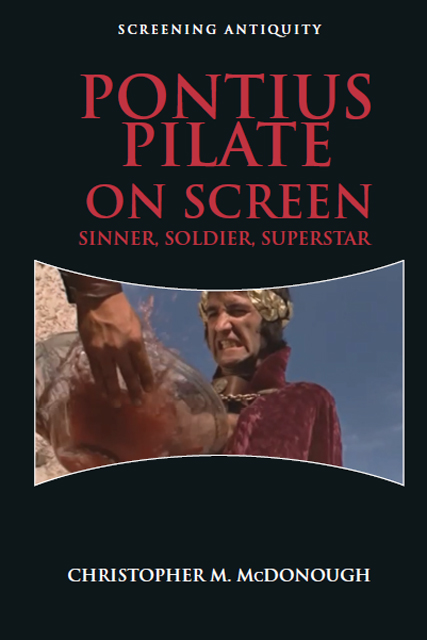Book contents
- Frontmatter
- Contents
- List of Figures
- Acknowledgements
- Series Editors’ Preface
- Frontispiece
- Prologue: ‘Do You Enjoy Being a Symbol, Pontius?’ The Trial of Pontius Pilate and Governor Collins
- 1 Quod Scripsi Scripsi
- 2 The Silent Pilate
- 3 The Roman in the Living Room: Pilate on TV in the Early 1950s
- 4 Mrs Pilate: Claudia Procula and Clare Boothe Luce
- 5 Pilate in CinemaScope, or Notes on Roman Camp
- 6 Finding Meaning in the Middlebrow: Pilate in the 1960s
- 7 What Is Truth? Pilate as 1970s Moral Relativist
- 8 Michael Palin’s Accent in Monty Python’s Life of Brian, and a Few Others
- 9 Grand and Not-So-Grand Inquisitors of the Reagan Age
- 10 ‘We at War’: Pilate for the New Millennium
- Epilogue: A Time of Handwashing
- Works Cited
- Index
4 - Mrs Pilate: Claudia Procula and Clare Boothe Luce
Published online by Cambridge University Press: 03 June 2023
- Frontmatter
- Contents
- List of Figures
- Acknowledgements
- Series Editors’ Preface
- Frontispiece
- Prologue: ‘Do You Enjoy Being a Symbol, Pontius?’ The Trial of Pontius Pilate and Governor Collins
- 1 Quod Scripsi Scripsi
- 2 The Silent Pilate
- 3 The Roman in the Living Room: Pilate on TV in the Early 1950s
- 4 Mrs Pilate: Claudia Procula and Clare Boothe Luce
- 5 Pilate in CinemaScope, or Notes on Roman Camp
- 6 Finding Meaning in the Middlebrow: Pilate in the 1960s
- 7 What Is Truth? Pilate as 1970s Moral Relativist
- 8 Michael Palin’s Accent in Monty Python’s Life of Brian, and a Few Others
- 9 Grand and Not-So-Grand Inquisitors of the Reagan Age
- 10 ‘We at War’: Pilate for the New Millennium
- Epilogue: A Time of Handwashing
- Works Cited
- Index
Summary
While he was sitting on the judgment seat, his wife sent word to him, ‘Have nothing to do with that innocent man, for today I have suffered a great deal because of a dream about him’.
– Matthew 27:19From this single sentence in the Gospels, a rich set of legends has grown about Pontius Pilate’s spouse, named Procla or the more Roman-sounding Procula in the tradition. Although it is brief and not physical in nature, Matthew portrays her suffering as aligned and in sympathy with Jesus’ own suffering. As a consequence of her perceived participation in Jesus’ passion, the belief arose as early as the second century AD that she was the first Gentile woman to convert to Christianity and, as such, she has been canonised in the Greek Orthodox and Abyssinian Churches. That the dream of Pilate’s wife closely seemed to resemble that of Caesar’s wife, Calpurnia, before his assassination suggested a Roman aristocratic background, and later commentators connected her with the Claudia mentioned in Second Timothy (4:21). By the Renaissance, her name had been filled out to Claudia Procula, and she was further imagined to be a member of the Julio-Claudian family, perhaps a niece or even daughter of Emperor Tiberius. Whether Pilate’s wife ever actually existed may not be known – although there is, in fact, archaeological proof of a woman in the later first century BC buried near Beirut with two golden bracelets on which the name Claudia Procla has been inscribed in Greek – her legend developed for those audiences of Gentile Christian women to whom such a figure would have had much appeal.
As brief as her anonymous mention is in the Bible, the afterlife of Pilate’s wife in the later tradition is extensive, and she features in genres as varied as New Testament apocrypha, late antique legends, medieval art and drama, Romantic poetry and contemporary novels. Her character, likewise, runs the gamut of portrayal: a major figure in the 30th York Mystery Play, for instance, where she is called Percula and her dream is inspired by the devil, she speaks highly of her husband – ‘my duke doughty’, she calls him – and of herself says: ‘All welle of all womanhede I am, wittie and wise’.
- Type
- Chapter
- Information
- Pontius Pilate on ScreenSinner, Soldier, Superstar, pp. 65 - 90Publisher: Edinburgh University PressPrint publication year: 2022



